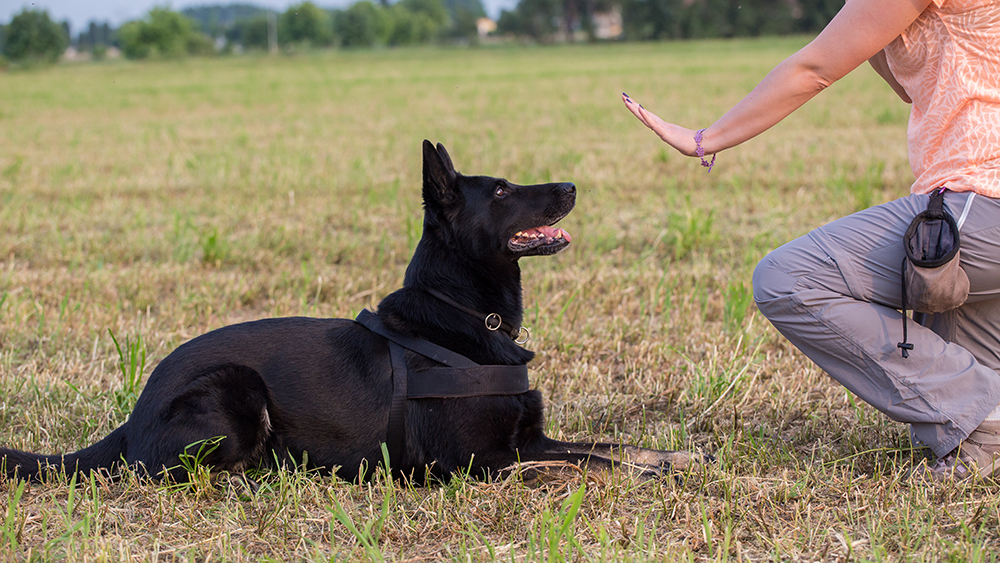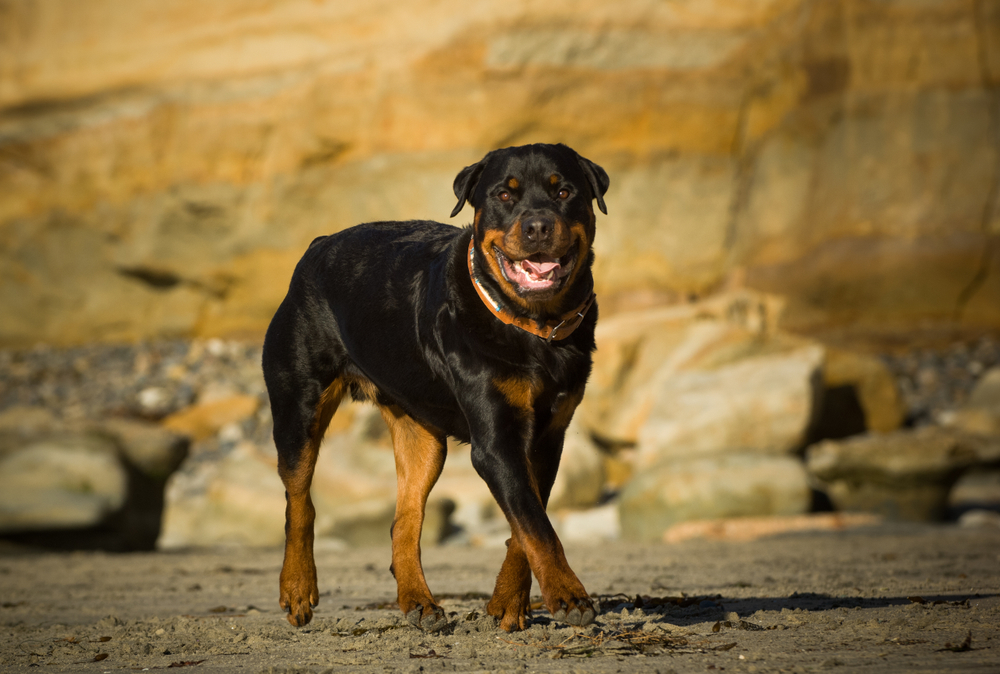Click Below to Skip Ahead
The Pitmatian is a curious crossbreed of two large and decidedly different dogs: the Dalmatian and the Pitbull. Dalmatians are a famous breed known for their signature spots and service to firehouses, and Pitbulls have a notoriety of their own (despite not being a singular breed).
Read on to discover how these two dogs create the charismatic Pitmatian and how best to care for one.
Breed Overview
Height:
18–24 inches
Weight:
30–70 pounds
Lifespan:
11–13 years
Colors:
Black and white, fawn, brindle, black, blue, liver and white
Suitable for:
Active families, those looking for a loyal companion, people confident in dealing with powerful dogs, families with older children
Temperament:
Loyal, intelligent, active, loving, dignified, eager to please
Pitmatians take characteristics from the dotty Dalmatian and the powerful Pitbull. Because Pitbulls are not technically a breed but rather a blanket name for a range of dog breeds, we’ll discuss the cross of a Dalmatian and an American Pit Bull Terrier (as recognized by the British Kennel Club).
Dalmatians are aloof with strangers and lovingly protective of their families, while the Pitbull is outgoing and brimming with love and affection. These traits can pair beautifully with the Pitmatian, making them loyal and loving yet very protective (sometimes to a fault).
Pitmatian Characteristics
Pitmatian Puppies
Pitmatian puppies are likely to be an accidental pairing, considering Pitbulls are restricted in many cities. You’ll likely find a Pitbull cross, such as a Pitmatian, in a shelter. Some shelters have several Pitbull mixes looking for forever homes.
However, you may have to look closely or ask to confirm the crossbreed, as many shelters will focus on the Dalmatian side of the cross and name them accordingly! Pitmatian puppies are likely to be rambunctious, as all puppies are, and they’ll likely be very active. You can begin socializing and training as soon as possible to avoid any behavioral problems down the road.
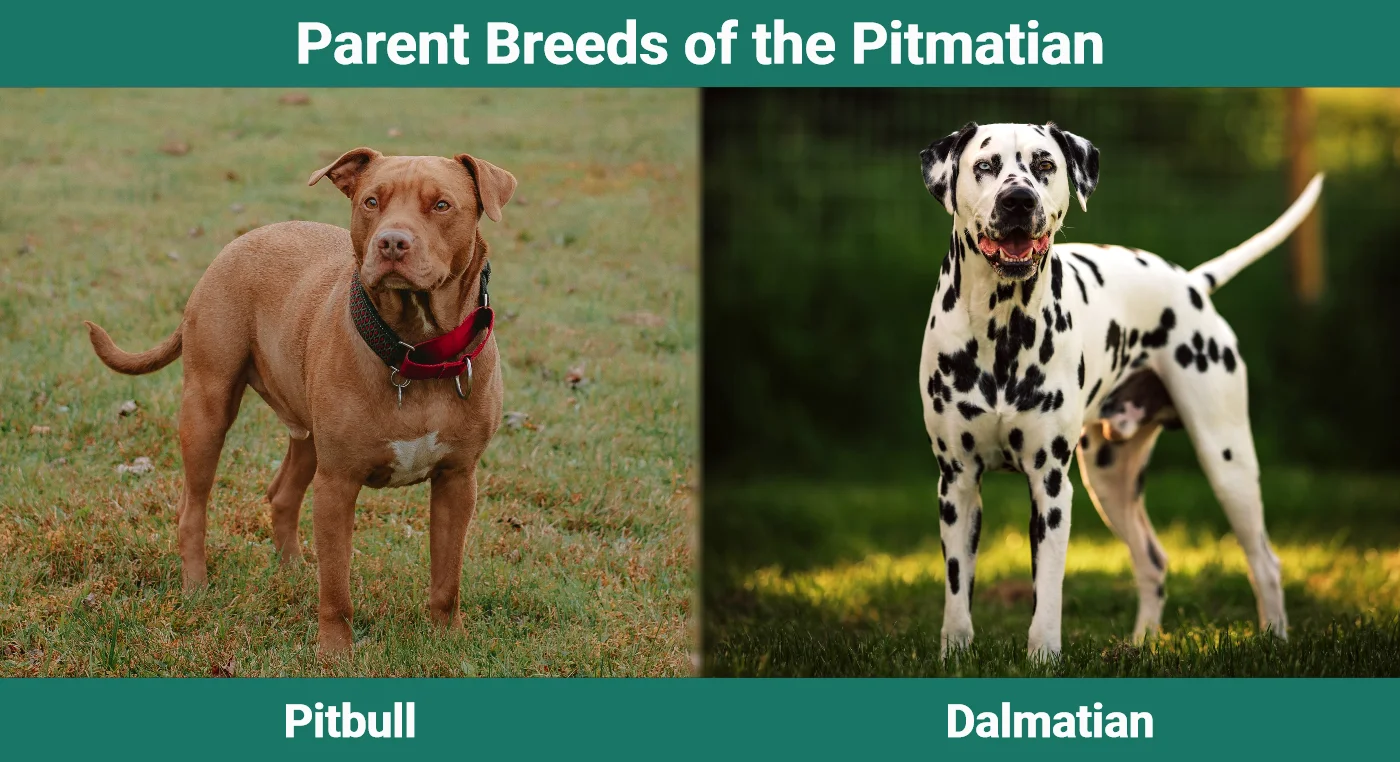
Temperament & Intelligence of the Pitmatian 🧠
A Pitmatian has an eclectic mix of traits, so their personality can be quite a gamble! However, some traits are strong parts of both the parent breeds, so there are certain things you can count on when it comes to your Pitmatian, such as their intelligence.
The Dalmatian and the American Pitbull are intelligent dogs keen to make their owners happy. Strength and a loving disposition towards their owners are also likely, but you should expect some animosity towards strangers and other dogs.
Are These Dogs Good for Families? 🏡
The Pitmatian is best suited for families with older children since the parent breeds are strong and powerful dogs. Pitbulls have a bad reputation and are often thought to be bad around children, but they’re actually pretty good with children if they’re well-socialized. Dalmatians are in the same boat, but both breeds shouldn’t be left alone with small children unsupervised.
The same goes for the Pitmatian! Small children aside, families with the time and dedication to training these dogs will receive a loyal, loving, and well-balanced family pet, so putting in the effort and ensuring they’re socialized well can make all the difference.
Does This Breed Get Along with Other Pets? 🐶 😽
Dalmatians and Pitbulls are generally tolerant of other dogs if well socialized, but they can have some reservations. The Pitmatian is the same and will be comfortable around unfamiliar dogs if they’re socialized correctly.
However, cats should be closely monitored around Pitmatians at all times, and small furry pets (like rabbits) shouldn’t be introduced to your Pitmatian since they have a strong prey drive.
Things to Know When Owning a Pitmatian
Pitmatians need the same love and care as any other dog, but certain elements of their personality and physical strength might need special attention. Pitbulls can be anxious and suffer from separation anxiety, so special attention should be paid while training Pitmations. Similarly, Dalmatians can sometimes be aloof and even suspicious of strangers, so reassuring and guiding your Pitmatian during training can work wonders.
It’s also important to mention that Pitbull mixes (including Pitmatians) may be penalized under breed-specific legislation in some states and counties; you should check the restrictions your state or county has regarding Pitbulls and Pitbull mixes before adopting your Pitmatian.
Food & Diet Requirements 🦴
Your Pitmatian will need a balanced diet suited to their size and life stage to keep them healthy. Pitmatians are generally classed as large dogs, so feeding your Pitmatian puppy a large puppy diet is ideal. This is important since larger breed puppies can grow too fast if their calories and nutrients aren’t balanced in their food, potentially causing bone deformities and pain.
Pitmatians will likely reach their full height at around a year old but will continue to mature and put on muscle for another year. Feeding a large dog an adult maintenance diet is vital to keeping your Pitmatian fit and healthy, and not overfeeding them treats will keep them slim. You should consult your vet to decide how much your Pitmatian should be fed; all mixed breeds have different nutritional requirements.
You should feed your Pitmatian the highest quality food you can afford, and ensure any foods you give them meet AAFCO (Association of American Feed Control Officials) standards so you know they’re getting the proper nutrition!
Exercise 🐕
Pitmatians are likely to be very active and need an outlet for their energy since Dalmatians and Pitbulls are energetic dogs. Dalmatians have incredible stamina and were used as coach guards and firetruck escorts. Pitbulls were bred to fight in dog fighting rings (sadly), so they are usually brimming with muscle and power.
Pitmatians need around an hour and a half of rigorous daily exercise, including brisk walks and the opportunity to run. However, you need to be aware of any rules and regulations in your area that may prohibit your Pitmatian from being out in public without a leash or muzzle.
Training 🦮
Pitmatians are intelligent and eager to please (like their parents) and do well with firm but positive directions during training. Because both parents are smart, the Pitmatian can become bored with stale or repetitive training. This is when you might see their independent and aloof side come out! To avoid it, keep training exciting and incorporate short lessons with lots of praise.
The right training can ensure your Pitmatian is the most loving, warm-hearted family dog you’ll ever meet. Exposing the dog to different sounds, situations, places, and people is incredibly important so they will be confident and well-behaved when grown. Pitmatians thrive on routine, and incorporating dog sports such as dick diving or agility can be a fantastic outlet for them and a chance to show off their skills.
Grooming ✂️
The Pitbull and the Dalmatian are short-coated dogs with sleek and sharp hair, so grooming duties with a Pitmatian should be light. However, the Pitmatian sheds frequently! Weekly brushing with a rubber brush or comb can be all it takes to remove loose hairs and reveal a sleek and shining coat beneath.
Pitmatians can be prone to skin irritation and allergies, so removing dead hair and keeping the oils on their fur is important. Overbathing can cause dryness and skin issues, so only bathe your Pitmatian when they need it! Nail clips are essential for a Pitmatian, and you should trim them every 3 or 4 weeks.
You should also check your Pitiamtians ears regularly and clean them daily to prevent bacteria and wax buildup that can cause infection. This is vital, especially when they have floppy ears.
Health and Conditions ❤️
Luckily, the Pitmatian is a relatively healthy dog. However, that doesn’t mean that they can’t inherit some health problems, and all dogs are prone to certain conditions. The following are some conditions that the Pitmatian is vulnerable to:
- Obesity
- Dental disease
- Allergies
- Deafness
- Kidney stones
- Hip dysplasia
- Hypothyroidism
- Epilepsy
Male vs Female
Male Pitmatians are generally bigger than females. Male American Pit Bull Terriers can weigh as much as 10 pounds more than females, and male Dalmatians tend to be taller than females. Your Pitmatian could be muscular but slender, muscular and bulky, or a mix of both! The temperament of male and female Pitmatians is generally the same.
 3 Little-Known Facts About The Pitmatian
3 Little-Known Facts About The Pitmatian
1. Their Parent Breeds Both Worked with People
Dalmatians and Pitbulls worked closely with people in the past. Dalmatians were the runners and protectors for gypsy caravans and travelers along highways, and they accompanied fire tricks to clear the way for the horses as they thundered along.
Pitbulls have fought in wars beside humans and are not used as rescue dogs. So, the Pitmatian is bred to live alongside people!
2. Dalmatians and Pitbulls Are Famous for Different Reasons
As mentioned above, Dalmatians are well known for their heroics in the past. They’re also famous thanks to Disney since they were the stars of their movie “101 Dalmatians”. Unfortunately, Pitbulls haven’t had the same kind of positive press; they are controlled or outright banned in some areas due to bad publicity surrounding dog attacks.
3. They Can Come in a Rainbow of Colors!
Because Dalmatians come in more than just black and white colors, and Pitbulls come in numerous colors and patterns, the Pitmatian can have a really interesting coat! Dalmatians come in white with the following spot colors:
- Lemon
- Liver
- Black
- Blue
- Brindle
Combine this with the colors a Pitbull can come in, including black, red, white, blue, brindle, and fawn, and your Pitmatian can have a unique coat color and pattern!
Final Thoughts
Pitmatians are excellent pets, but they’re not for everyone. Aloofness and independence can make them off-putting to some, and they’re likely to be at least a little wary of strangers. However, with proper socialization and consistent training, the Pitmatian is one of the most loving, loyal, and confident dogs you’ll ever meet! They’re sappy and affectionate, and there’s no better pup to cuddle up to.
Pitmatians might get some attention for being a Pit bull cross breed, and you might need to make special preparations for them, but they’re great companions for owners experienced with large, strong-willed dogs.
Related Read:
- Goldmatian (Dalmatian & Golden Retriever Mix): Pictures, Guide, Info, & Care
- Great Dane Dalmatian Mix Info: Pictures, Temperament & Traits
Featured Image Credit: Ana Raffo, Shutterstock

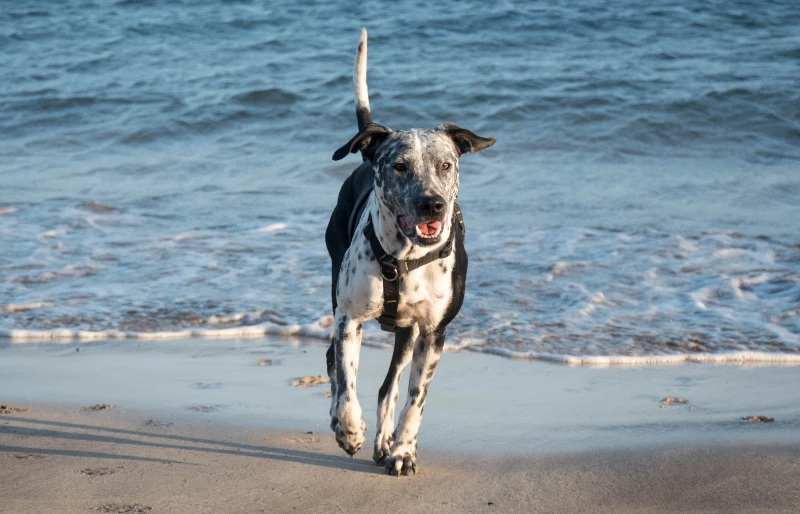
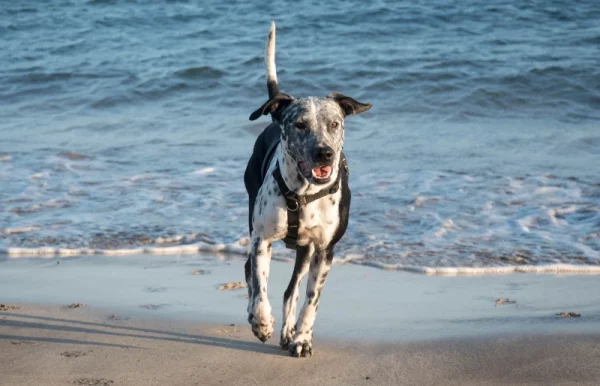


 3 Little-Known Facts About The Pitmatian
3 Little-Known Facts About The Pitmatian
